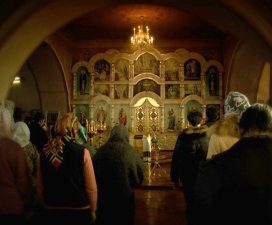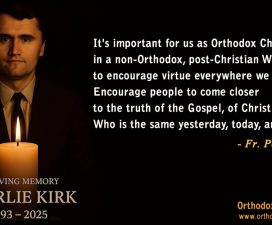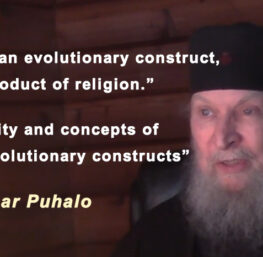Virtue Online | David Virtue | June 18, 2007
First came the irregular ordination of women to the priesthood, and then homosexual behavior was deemed acceptable including the ordination and consecration of an openly avowed homosexual to the episcopacy, concomitantly with same sex blessings for all. The elastic band of The Episcopal Church’s theology has been stretched to its limit with the announcement that the Rev. Dr. Ann Holmes Redding, an Episcopal priest and theologian in the Diocese of Olympia, has become a practicing Muslim.
Short of digging up a year old corpse in an Episcopal Church graveyard and marrying it to a liberal bishop of questionable beliefs while using the New Zealand Book of Common Prayer, have we now reached the final stage of public Episcopal blasphemy – the notion that one can be both a Christian and a Muslim at the same time? Has the elasticity of the Anglican Communion finally snapped?
In an interview with the Rev. Dr. Ann Holmes Redding by Norah M. Joslyn, published in the Diocese of Olympia newspaper, Holmes told Joslyn, “The way I understand Jesus is compatible with Islam, and although there are Christians and Muslims who think I must convert from one to the other, the more I go down this path the more excited I am about both Christianity and Islam.”
Redding credits her upbringing for early exposure to interfaith relationships. An African Methodist Episcopal minister baptized her but the only Sunday school she attended was Episcopalian. She attended a Unitarian youth group in high school when the Episcopal group disbanded. A cooperative community comprised of mostly Quakers, Unitarians and Jews near where she grew up influenced her.
Her father was a prominent civil rights lawyer whose work brought him and the family into contact with people of many faiths.
. . . more




Christopher –
Is it your position that evangelism can never occur by means of debate?
Expanding on the point that Fr. Hans brought up in #50, you might think of your posts as being aimed primarily at the many thousands who for some reason or another visit this site.
For better or worse, you, Dean S., Jim, Michael, etc. are “in the arena”. There are many spectators who will be influenced by your words.
You have all deliberately misinterpreted and distorted what I wrote, in a manner which makes me wonder at your motiives and intent.
Did you not see where I clearly wrote:
My intent was to show that there was enough common belief between Chistianity and Islam to serve as a rationale for peaceful coexistence. We are directed by Our Savior and the founder of our faith to work for peace and healing in the world. While Our Lord dwelt on this planet he taught us that peace was the goal we should work for. “Blessed are the peacemakers”, he said during the Sermon on the Mount. “Those who live by the sword, shall die by the sword”, He told Peter. If someone slaps you on the one cheeck, turn the other cheek.”
The deliberately provacative and confrontational approach of some Christians towards the entire Islamic world, and the willfull slandering of their faith as demonic, when in fact they believe themselves to be worshipping the same God as us, is a sin before God. It directly and defiantly violates of Christ’s teaching regarding our relations with others.
As a faith, Islam has serious deficiencies. That does not change the fact that Islam has incorporated enough of the values of Judiasm and Christianity to someday serve as a foundation for the evolution of islam into a more peaceful and progressive belief system. Our job as Christians is to help that evolution along and not inhibit it with reckless belligerence.
St. Gregory Palamas was actually captured and taken prisoner by the Turks in 1354 and lived amongst them for a year. His experience is illustrative of the true Oprthodox approach toward Islam.
From: Christianity and Islam: The Record of History as Seen in the Lives of a Number of Orthodox Saints , David C Ford
Dean you have not answered the question. Do YOU believe salvation can be found in the teachings of Muhammad?
It’s a rather simple question that only requires a simple answer; yes or no?
Dean,
Dr. Ann Holmes Redding’s exicitation has giver her an oxymoronic view of the world, this is ecumenism gone a little astay.
Sincerely,
J R Dittbrenner
Christopher,
Thank you for your question. There are some who post here on this site that I will not “banter” with. If there is a clear concise answer that I can give that no one else has given, I’ll think about it. With Dean I take a much different approach. He is an Orthodox brother with whom we are united by the Body and Blood of Jesus Christ. I feel a responsibility to do my utmost to communicate with him on essentials of the faith in which he seems to be lacking. I hope that others take the same approach with me. In a venue like this, it is quite easy for me to allow my ego to run away with me and I am sure that I extend the debate beyond what is fruitful at time. On that score I will try to monitor myself more closely.
However there have been a number of posts Dean has made such as his latest on St. Gregory that I have found value in. Since we all ask mercy from our Lord, “That same prayer of mercy demands that we render deeds of mercy”.
You are perfectly free to dismiss my words as false humility and spiritual puffery if you wish. Even if Dean does not change his approach and ideas (which I do not expect), he does represent a mindset in the Orthodox Church that cannot be met simply by attempting to exclude it or refusing to engage it. At the same time, his approach should not go unchallenged as indicative of the Orthodox Mind. My exchanges with Dean are good practice in doing the best job of articulating the Truth I have found within the Church. Even if he never listens, someone might. An added bonus is that my own faith becomes stronger when I am able to hone my expression of it through prayer, research and contemplation.
Note 53. Dean writes:
Change “seeing something good in Islam” to “seeing something good in the man” (most likely the awareness the repentance is necessary for salvation), and we correctly understand how St. Gregory proceeded to declare the True God just as St. Paul did on Mars Hill.
So here is the key: The point was not to impart “right belief”; it was to impart Jesus Christ, who, when the Gospel is preached and heard, is revealed. (St. Gregory probably discerned the man was ready to hear.)
So it is not a matter of supplanting Islamic precepts with Christian precepts as such. Rather, it is confidence in the innate power of the Gospel to reveal the Risen Christ. This transformative power of the Gospel of Jesus Christ (heard by those who have “ears to hear”) precedes all else, including dogma, doctrine, liturgy, even practical lessons on how to do missions.
Tom asks:
Is it your position that evangelism can never occur by means of debate?
No, IF the “debate” is genuine. With Dean, Jim, and a lesser extant others there is no debate at all. Look at Dean’s follow up where he says:
You have all deliberately misinterpreted and distorted what I wrote, in a manner which makes me wonder at your motives and intent.
Dean has no ability to question his own thinking. If we don’t understand him it’s because (at best) of a communication problem, or (worse) a deliberate and willful “misinterpretation”. The fact that we do understand him, and are talking past him (because of a stubbornness on his part, or his inability to step outside his thinking, whatever) never crosses his mind. He is stuck in a secular, liberal protestant, fill-in-the-blank rut.
Such folks do not need evangelism by “debate” because the bantering is poison to their disposition, not helpful. It only hardens them, it does not lead them to Orthodoxy (or anything else). To borrow an idea from psychology, we “enable” Dean and Jim by providing the drug they seek.
Also, such debate with Jim and Dean is the lowest form of debate. The many many spectators to this site at best see it for what it is, an endless bantering back and forth between people who are not even really talking with each other, only at each other. At worst, and I believe the majority, over-interpret this bantering and are thus “turned-off” by it. Compare the tone and quality of the threads here to the blog at say, Touchstone’s “Mere Comments”. Somehow, with a much greater number of posters, they manage real and uplifting debates with only a very occasional insertion of a Troll. Threads there are in most ways not a “turn-off” to sensible lurkers, and have real potential as an evangelical mechanism.
Most of the threads here do not qualify. I suggest most threads here accomplish the opposite of what we (as Orthodox) would hope. I suggest it is because of two people, who have no intention (are not at a point spiritually or otherwise in there lives) of “debating” in a way that would reflect anything to do with Orthodoxy…
# 56:
See post # 58. I would suggest that while you are:
“My exchanges with Dean are good practice in doing the best job of articulating the Truth I have found within the Church.”
You are hardening Dean’s heart, and turning off others. Sensible folks question the context of the “debate”, not just one side or another’s good or bad articulations and expressions. In other words it’s non just the message, the medium comes into play also.
If as an uninitiate, I walked into a Church, and found fornication, debauchery, etc. going on right there during the liturgy, I would question not only the sinners I saw, but the message being delivered (was it true, why the incongruity, etc.)
So while you are practicing, no good is being done with/for Dean and Jim and I would suggest the evangelical “content” is not getting through…
Another thing to be gained from Dean’s post on St. Gregory: Orthodox evangelism is personal. It is not aimed at a group such as Islam, it is conducted on a one of one basis. Jesus says the good shepard will leave the 99 and go in search of the one.
The other point to recognize is that St. Gregory held no illusions about Islam. He saw in the one man a disposition of soul that could be touched. It is also abundantly obvious that St. Gregory would not attempt to change the teaching of the Church to attract Muslims or young people or whoever as Dean suggested we do with regard to homosexuality. The third point is the depth of understanding from which St. Gregory operated. Any of us who wish to evangelise have to go as deeply as possible into the heart of our faith in order to share the story with truth, depth and beauty.
Finally, St. Gregory refused to conform his thought or practice of the faith to the prevailing intellecutal currents of the day (the Scholasticism of Barlaam). He suffered at the hands of his brothers and sisters in Christ because he refused the easy way out.
Christopher –
I will give it a look. Maybe it will help me to understand your position better.
Dean, I am sure you think that what the Muslim holy man was doing was theological in nature (praying for the dead). It was not. St. Gregory turned it into a moment of theological teaching by taking a human act of devotion and attempting to direct it towards Jesus Christ.
It is true that we must not allow ourselves to enter into an hysteria about Islam any more than we should about global warming. Just as trying to convert “Islam” is futile and unnecessarily dangerous, so is trying to “save the world” by our worldly acts.
I do earnestly hope and pray, Dean, that you do actually study the essentials of Orthodox Christianity and eschew your apparent thralldom to the prevailing liberal ideology. Just as I hope and pray that any who put conservative ideology in place of the Church’s teaching will stop doing so by going more deeply into the Church.
Three dimensions of Islam that cannot be ignored
1) Islam to expressly intends supplant and supercede Judaism and Christianity
Mohammed saw himself as a reformer called to God in response to religious corruption.
Problem is that what Mohammed believed was “religious corruption” is exactly what Jews consider to be the Torah and what Christians believe to be the Old and New Testaments. This puts ecumenism with Islam on a special footing. Muslims believe our Scriptures are corrupt lies, totally corrupt lies. Mohammed arose as a means of wiping out and replacing Judaism and Christianity. This is a very “special relationship” that doesn’t exist between Buddhism and Christianity or Hinduism and Christianity.
2)Islam is a political system
Secondly, Mohammed, from the beginning, saw himself as the founder of a polity which expressed the manner in which God wanted humans to live. Mohmmed established a MUSLIM STATE. Islam has from the beginning been a political entity which sought to expand its scope across the globe through the use of violence against non-Muslims.
3) Mohamed is the intellectual choke-point
Thirdly, all of Islam emanates from a single witness, Mohammed. He is the sole source of revelation to the remainder of mankind AND his revelations invalidates what was previously considered to be legitimate revelation, the net effect is that ONLY MOHAMMED OF ALL HUMANS could be called a true prophet. But wait you ask, what about the Muslim claim to honor Abraham.
Only the name is the same and virtually every other aspect of the story of Abraham is changed. Two people can be named “Bob” but that doesn’t mean they are the same peeple. Both Judaism and Christianity have many witnesses across time, not just one; this makes Mohammed only source of truth about God.
I would be somewhat relieved if Dean acknowledged these special aspects of Mohamedanism. I think it is useful to call Islam Mohamedanism because the entire intellectual ball-of-wax came from him and only him. If Mohammed was not a true prophet the entire edifice crumbles in a heap of dust unworthy of any serious consideration. Muslims are aware of this and they will kill to prevent any from critiquing their creepy “prophet.”
I would breathe easier if Dean would acknowledge these points and take them into consideration in the discussion of formal dialogue between the two groups.